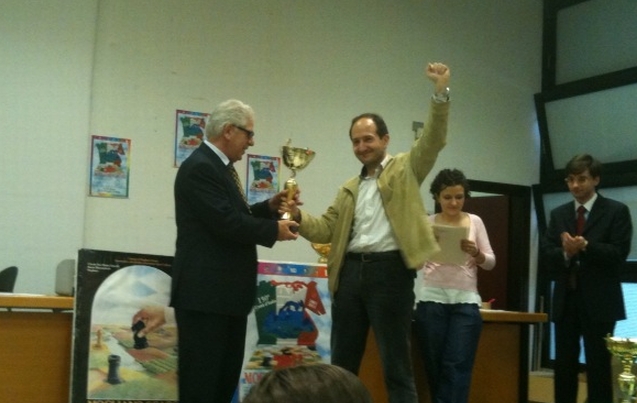Because of the above, you may well imagine that I was thrilled to spend four days playing chess at a tournament in Mogliano Veneto -an event that has reached its 33rd edition this year. The tournaments there are divided in a "A" section for players above 1900 Elo points, a "B" section for players with Elo between 1600 and 1899, and a "C" section for lower-rated players. After many years playing in the "A" section, and then many years of absence (work has prevented me from active play for quite a while, but I am now back after a decade), my rating had been revised and I had to play in the "B" section this year. Which meant having more fun with players mostly weaker than myself -if I could prove it!

I played six games, winning four and drawing two, and won the tournament ahead of 45 other players. I was especially pleased to find out, during post-mortem computer analysis, that I did not commit one single bad mistake in my games; concentration was the key! During the 3-4 hours of each game (the cadence was 100 minutes per player, plus 30 second increments per move) I almost never rose from my chair, thinking also on my opponent's time. I reasoned that due to my weakened mental capabilities (if compared to 12 years ago) I needed to compensate with a doubled effort. And it paid off, if we judge by the quality of my play.
After a quick and easy win against a weak opponent on round one, I had a very difficult game to play against a blind player (a part of the game with a riddle for you is in a later post here). The fact he was blind meant that we played separated from the other players, that he had a private small chess board which he was allowed to touch, and that I was to move both his and my own pieces on the main board, plus that every move needed to be announced aloud; in addition, I was facing him plus his mother, who was there only to let him know how much time we had on our clocks.
The combination of these factors really makes it hard to concentrate, as one is in a very unfamiliar setting and with a different routine from that of normal play. It was really psychologically straining to play under those conditions. On the other hand, it is of course right to allow blind people to play, even if it entails some modifications to the game routine. Maybe to make things more "normal" the tournament rules should dictate that the accompanying person move the pieces on the board, rather than burdening the opponent. It is disrupting to have to play a strong move with your opponent's piece!
In the following I show a couple of positions with critical moments of some of the games I played.
A decisive win was the one I had on the fifth round, when I was white against Luca Marson. We had both 3.5 points out of four games, and the winner would get to the clear lead of the tournament. Luca is from my own chess club, but we had never played together before. We played a Sicilian Alapin opening, and then I was able to put together a promising position:

Here black has just played 17... Qa5. Can you spot what is wrong with this move ? White continued 18.Nc4! which forcefully wins the exchange: 18....Qb4 (Qd8 is no better) 19.Nxd5 Nxd5 (if 19....Qxb3? 20. Nxe7! wins) 20.Bxd5 exd5 21.Nb6! and the rook is trapped (21....Ra7 22.Bb8).
Black played 21....Qxb3 22.axb3 Be6 23.Nxa8 Rxa8, and there followed a long ending, not completely trivial to win, which I played well enough to bring home the full point at move 59.
And now let me show you one game I did not play at my best. I had black against Alberto Barp, a promising 13-year-old kid. After an inaccuracy by white we reached the following position:

Here the a5 pawn is destined to fall with correct play, and then black will have the advantage. After careful play to encircle it, I hastened to play the final manouver, wrongly playing 27....Nc3?! Instead 27. ...Kf7! or even 27. ...g5! would have been accurate, the point being that white cannot bring the Bg3 to the pawn's defence: 28.f3 is not possible because of Nxe3, and 28.Ke1 blocks the crucial e1 square: 28.Ke1 Nc3 29.f3 Na4 and there is no time for Ke2 and Be1, and the pawn a5 falls. Instead, 28.Ke2 allows 28...Nc3+! and the check gains the tempo necessary for 29....Na4 and 30.Bxa5. The game was soon agreed drawn.
All in all, a very nice tournament for me, a (modest) prize in money, and the confirmation that I can still play competitive chess if I put my mind to it.





Comments